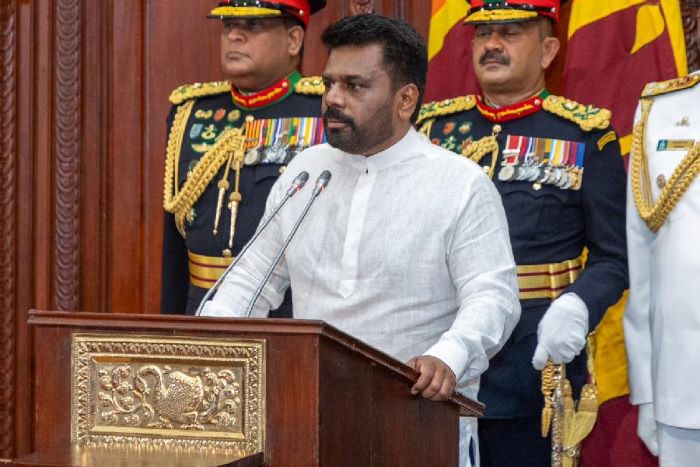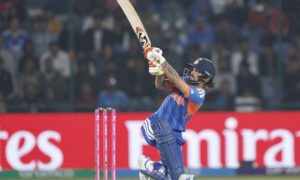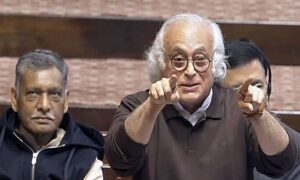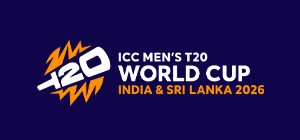
It’s a paradigm shift in Sri Lankan politics, making history by electing leftist Anura Kumara Dissanayake to power. A staunch Marxist, Dissanayake and his leftist political party, the Janatha Vimukthi Peramuna or JVP won with a whopping 5.7 million (42.3%) votes after two rounds of counting in the nation’s first-ever second preference vote count – defeating Sajith Premadasa of the SJB (Samagi Jana Balawegaya), who got 4.5 million (32.8%). It was a big defeat for incumbent President Ranil Wickremesinghe, who fought as an independent and was a distant third with 17.3% votes. Namal Rajapaksa, the son of former President Mahinda Rajapaksa, managed only 2.4% of the total votes. Truly, the voters rejected all the known and tested political leaders and dynasts – Rajapaksa, Wickremesinghe and Premadasa – who, they believe, were responsible to the island nation’s economic collapse.
It is a robust victory for Dissanayake which had won just over 3% of votes in the previous presidential election in 2019. Soon after his win, Dissanayake wrote on X, “This achievement is not the result of any single person’s work, but the collective effort of hundreds of thousands of you. Your commitment has brought us this far, and for that, I am deeply grateful. This victory belongs to all of us.” Dissanayake’s political activism began during his university days in the early 1990s, bringing him close to the JVP. His rise as JVP chief came after a long wait, in 2014. His flexibility and willingness to learn enabled him to grasp Sri Lanka’s economic issues and relate to the rural and working-class citizens, especially through the country’s worst economic crises in the late 2010s and early 2020s. His brief stint as Agriculture Minister also helped him connect with Sri Lanka’s rural agricultural sector, setting him apart from the political elite. Fed up with steep inflation, food, fuel and medicine shortages and swelling debt, people overthrew Rajapaksa family in 2022. Dissanayake’s anti-corruption stance and promise of political reforms appealed to the masses, especially the youth.
Prime Minister Narendra Modi congratulated Dissanayake on his victory and said he looks forward to working closely with him to further strengthen the Indo-Lanka relations. Dissanayake thanked PM Modi for his ‘kind’ words and support and said he shared his commitment to strengthening ties.
We are committed to creating a law-abiding nation and fostering a disciplined society while ensuring the social security of all citizens. This revives the principle that ‘everyone is equal before the law.’ pic.twitter.com/YirkBa0N2m
— Anura Kumara Dissanayake (@anuradisanayake) September 27, 2024
However, Sri Lanka has undeniably moved towards China in the past 15 years, handing many lucrative projects to the country. Among other projects, China snagged one to develop an airport in Colombo. Earlier, the strategically important Hambantota Port, situated along the world’s busiest shipping lane linking Asia and Europe was given to China, which gave it an upper hand in the region. India needs to use its diplomatic channels to ensure that Indian investments like the wind power project in the northern part of Sri Lanka are not jeopardised. Given the project’s strategic location in northern Sri Lanka, any setback could mean a Chinese company or its proxy taking over, which would be a concern given the significance of the region and the presence of the Tamil minority.
Historically, JVP has been anti-India, especially during the late 1980s, when the party held agitations against Indian imports, including medicines and drugs. India will also be concerned about the Tamil population in Sri Lanka, as Dissanayake’s party has had a complex and antagonistic relationship with Tamil nationalism and LTTE. The JVP opposed the Indo-Sri Lanka Peace Accord in 1987, and did not support the implementation of the 13th amendment of the Sri Lankan Constitution, which delegates powers to the country’s Tamil minority.
Though Dissanayake displayed his eagerness to engage with India as early as February 2024 and met with Foreign Minister S Jaishankar and National Security Adviser Ajit Doval.
Reposing their faith in Dissanayake as their last hope, Sri Lankans are anxiously waiting to see how things will unfold for them in coming days. As President, Dissanayake has a lot on his plate on the domestic front, and fixing the distressed economy will certainly be his priority. For India, which at the moment is surrounded by tensed neighbourhood ( China, Pakistan, Afghanistan, Bangladesh), it will be wait-and-watch situation as the days pass by.


















